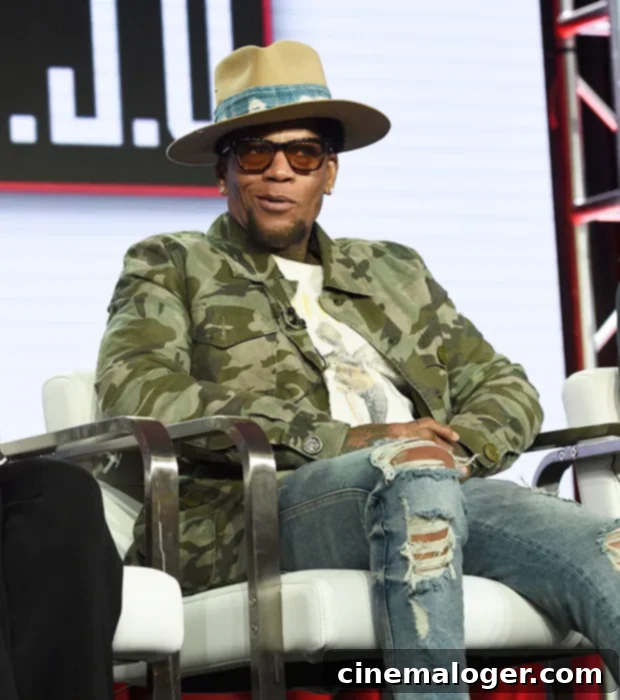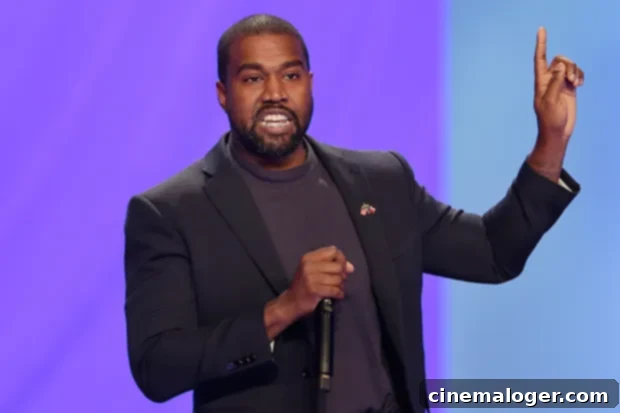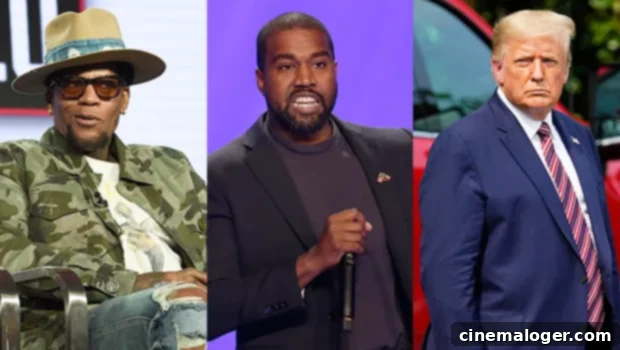D.L. Hughley Unpacks Kanye West’s Trump Affinity: A Deep Dive into Shared “Narcissism” and Political Ambitions
Comedian D.L. Hughley, known for his sharp political commentary and unfiltered opinions, publicly articulated his understanding of Kanye West’s controversial admiration for Donald Trump. Hughley posited that the two highly public figures are fundamentally the same type of “narcissistic” individual, suggesting that a potential “West White House” would mirror the tumultuous presidency of Donald Trump. This insight came as West’s unexpected presidential announcement sent ripples through the political and entertainment spheres, prompting widespread discussion about his motivations and the feasibility of his unconventional campaign.
Hughley’s observations, delivered with his characteristic blend of humor and biting truth, offer a compelling lens through which to examine the intricate relationship between celebrity, politics, and public perception. His commentary goes beyond superficial criticism, delving into the psychological and behavioral patterns he perceives as shared between the rapper and the former president. The discourse surrounding Kanye West’s political aspirations, especially his initial alignment with Trump, has been a significant talking point, raising questions about political endorsements from public figures and the impact of their personal convictions on broader societal narratives. Hughley, through his candid remarks, aims to strip away the celebrity facade and expose what he considers the core similarities driving their public actions and political leanings.
Hughley’s Incisive Comparison: Kanye West and Donald Trump as “Amoral” and “Narcissistic”
The comedian D.L. Hughley has been vocal about his assessment of Kanye West’s political trajectory, particularly since the rapper announced his improbable presidential run. Hughley, who appeared on the July 17 episode of The View, expressed surprise at the announcement but quickly clarified that, in his view, it made perfect sense given West’s perceived character traits. He drew a direct and unflinching parallel between Kanye West and then-President Donald Trump, labeling them as “discernibly” the same type of person.
Hughley didn’t mince words, articulating his reasoning for this striking comparison. “Discernibly, they’re the same type of men: they’re both amoral, they’re both narcissistic, and neither reads. And I’ve seen both of their wives naked,” he quipped, adding a touch of his signature provocative humor to underscore his point. This statement encapsulates Hughley’s core argument: beyond their public personas and political affiliations, West and Trump share a fundamental set of personal characteristics that, in his estimation, define their approach to life and public service. The comedian’s assertion of their shared amorality suggests a perceived lack of concern for conventional ethical standards, while labeling them both as narcissistic points to an excessive self-admiration and a preoccupation with one’s own image and importance. This psychological assessment forms the bedrock of Hughley’s claim that a Kanye West presidency would inevitably echo the style and substance of Donald Trump’s time in office, suggesting a similar brand of leadership rooted in personal ego and a disregard for traditional political norms.
Following Kanye West’s announcement that he’s running for president, comedian @RealDLHughley compares West to Pres. Trump: “They’re the same type of men. They both are amoral, they both are narcissistic.” https://t.co/Chg9DuK3FJ pic.twitter.com/SrrrbO9gOz
— The View (@TheView) July 17, 2020
The viral clip from The View quickly circulated, fueling further debate on social media platforms about the validity of Hughley’s comparison. His comments on the show were not an isolated incident but rather a continuation of his ongoing critique of Kanye West’s political leanings. Prior to West’s official presidential announcement, Hughley had already been vocal about his disapproval of the rapper’s public support for Donald Trump. This consistent stance underscores Hughley’s conviction that West’s political actions stem from a deeply ingrained personality type rather than a strategic political ideology. The timing of his appearance on The View, shortly after West’s surprising declaration, allowed Hughley to reinforce his previously stated positions with new, amplified relevance. It highlighted the comedian’s role as a significant voice in political commentary, unafraid to challenge prominent figures and articulate uncomfortable truths as he perceives them.
The Inexplicable Alliance: Kanye, Trump, and the Shadow of Obama
Despite his firm conviction about the shared characteristics of Kanye West and Donald Trump, D.L. Hughley admitted to one profound point of confusion: West’s seeming preference for Trump over former President Barack Obama. This bewilderment is particularly acute for Hughley, considering Kanye West’s roots. West grew up in Chicago, a city deeply intertwined with Obama’s political history, having represented the South Side in the Illinois Senate. For Hughley, the choice between these two figures should have been clear, especially for someone from a similar background.
“One is aspirational and one’s an ass,” D.L. quipped during his appearance on The View, succinctly summarizing his dismay. This stark contrast highlights Hughley’s belief that Obama represents a figure of hope, progress, and inspiration, particularly within the Black community and for individuals striving for positive societal change. In contrast, Trump, in Hughley’s estimation, embodies the antithesis of these values, an individual whose public conduct and policies he views as deeply problematic. The comedian’s puzzlement reflects a broader sentiment among many who struggled to reconcile Kanye West’s image as a groundbreaking artist and cultural influencer with his vocal support for a president whose rhetoric and policies were often seen as divisive and detrimental, particularly to minority communities. This ideological clash, viewed through the prism of their shared Chicago heritage, makes West’s political allegiance all the more perplexing for commentators like Hughley, inviting deeper questions about the complexities of personal identity, political alignment, and the influence of celebrity.
Beyond Narcissism: The “Irredeemable” Label for Black Trump Supporters
D.L. Hughley’s critique of Kanye West’s political choices extends beyond merely comparing him to Donald Trump. He has also articulated a much stronger, and more controversial, stance regarding Black individuals who publicly support Trump. Speaking on The Clay Cane Show, Hughley drew a clear distinction between being a Black Republican and being a Black Trump supporter, emphasizing that one is acceptable while the other, in his view, is not.
“I think you can be a Black Republican and be a redeemable human being. You can’t be a Black Trump supporter and be a redeemable human being. You can’t,” D.L. stated emphatically. This distinction is crucial to understanding Hughley’s position. He acknowledges the legitimacy of diverse political ideologies within the Black community, including conservative views. However, he draws a line when it comes to unwavering support for Donald Trump, whom he perceives as having a uniquely detrimental impact on the Black community and on society at large. His argument suggests that Trump’s actions and rhetoric transcend typical political differences, entering a realm that compromises the humanity of his Black supporters.
Hughley further elaborated on this controversial stance: “It’s impossible to be humane and a Black Trump supporter. It’s impossible to do that based on all the things he does and continues to do.” This powerful assertion implies that supporting Trump, given what Hughley views as his consistently harmful behavior and policies, fundamentally conflicts with basic human decency and empathy. This perspective highlights the deep emotional and ideological chasm that Trump’s presidency created, particularly within discussions of race and politics. For Hughley, the perceived detriments of Trump’s tenure are so profound that they render any Black individual who actively supports him as “irredeemable,” suggesting that such support necessitates a profound compromise of moral principles.

“The things he says and how detrimental he’s been. I can’t think of one black Trump supporter that I find redeemable in the most basic way.” To illustrate his point, Hughley named specific public figures he considers “irredeemable” examples of Black Trump supporters. He listed Kanye West, along with Fox News personalities Diamond and Silk, and conservative pundit Candace Owens. “Name me one that isn’t bat sh*t crazy… name me one,” he challenged, reinforcing his uncompromising position. This provocative and highly charged statement reveals the depth of Hughley’s conviction and his willingness to directly confront individuals he believes are complicit in what he views as a harmful political agenda. His commentary stirred significant debate, prompting both agreement from those who share his frustrations and criticism from those who view his remarks as unfairly dismissive of diverse Black political thought. Regardless of where one stands on the issue, Hughley’s words undeniably underscore the intense polarization and moral implications that often accompany discussions surrounding Donald Trump’s political influence.
Kanye’s Presidential Ambitions: A Flawed Launch and Lingering Questions
Kanye West’s announcement on July 4th that he was running for president of the United States caught many by surprise, injecting a new, unpredictable element into the 2020 election cycle. Operating under the banner of the “Birthday Party,” or “BDY Party” for short, West’s declaration was met with a mixture of amusement, skepticism, and concern. While the rapper’s history of outspokenness and unconventional public behavior might have prepared some for such a bold move, the actual launch of his campaign was plagued with challenges and ambiguities from the outset, leaving many questioning the seriousness and viability of his presidential bid.

The practicalities of a late-entry presidential campaign quickly became apparent, highlighting the significant hurdles West faced. As the weeks progressed, it became increasingly unclear whether Kanye was actually still in the race. He missed crucial deadlines to appear on the November 3 ballot in numerous states, with reports indicating he had failed to register in at least 10 states and counting. Furthermore, there was a noticeable lack of a robust initiative to secure his place on the remaining state ballots or to launch an effective write-in campaign, which would have required substantial grassroots organization and financial backing.
Adding to the confusion were conflicting reports from within his own nascent campaign. On the same day that one of his campaign advisors, Steve Kramer, reportedly told The Intelligencer that Kanye was “out” of the presidential race, an organization called “Kanye 2020” filed the first required form with the Federal Election Commission (FEC) to run for president. This contradictory information further muddled the waters, leaving political observers and the public uncertain about West’s true intentions and the organizational capacity of his campaign. The combination of missed deadlines, an apparent lack of cohesive strategy, and conflicting statements painted a picture of a presidential bid that was, at best, disorganized and, at worst, an elaborate publicity stunt. Regardless of the ultimate outcome, Kanye West’s brief foray into presidential politics became a significant topic of discussion, underscoring the complexities and challenges of mounting a serious national campaign, particularly for an unconventional candidate.
Analyzing the Public Figures: Celebrity, Politics, and Perception
The spectacle of Kanye West’s presidential run and D.L. Hughley’s biting commentary shines a spotlight on the broader phenomenon of celebrity involvement in politics. In an era where public figures command immense platforms, their political endorsements and personal ambitions can profoundly influence public discourse and even electoral outcomes. Both Kanye West and Donald Trump, in their respective ways, embody the archetype of the celebrity politician: individuals whose fame predates their political aspirations and whose public personas are inextricably linked to their political messaging. Hughley’s assertion of shared “narcissism” between them speaks to a perceived characteristic often associated with figures who thrive on public attention and possess an unshakeable belief in their own exceptionalism.
The parallels Hughley draws extend to their unconventional approaches to political engagement. Both figures have demonstrated a willingness to flout traditional political norms, eschew conventional campaign strategies, and communicate directly with their bases through social media and highly personalized rhetoric. This bypasses traditional media filters and established political infrastructures, creating a direct, often unfiltered, connection with supporters. This approach, while appealing to some as authentic and anti-establishment, is often criticized by others, including Hughley, as reckless, self-serving, and potentially detrimental to the democratic process. The public perception of such figures is constantly in flux, swayed by their latest pronouncements, controversies, and media portrayals. Hughley, as a comedian and political commentator, plays a critical role in dissecting these dynamics, using humor and direct critique to provoke thought and challenge established narratives.
The Broader Impact: Political Discourse and Identity
The exchange between D.L. Hughley and Kanye West, set against the backdrop of Donald Trump’s presidency, is more than just a celebrity squabble; it’s a microcosm of the complex and often contentious nature of contemporary political discourse, particularly concerning identity politics. Hughley’s strong condemnation of “Black Trump supporters” as “irredeemable” highlights the deep ideological fissures that emerged during Trump’s time in office, particularly within communities grappling with issues of race and social justice. His comments reflect a profound disappointment and perceived betrayal felt by many who believe that supporting certain political figures fundamentally undermines the collective struggle for equality and progress.
Such commentary, while provocative, serves to animate and shape public opinion, forcing audiences to confront difficult questions about political alignment, personal values, and group identity. It underscores the challenges faced by public figures, whether comedians or musicians, who navigate the treacherous waters of political engagement. Their words can spark vital conversations, but also generate intense backlash and further polarization. The ongoing debate surrounding Kanye West’s political forays, D.L. Hughley’s unyielding criticism, and the enduring legacy of Donald Trump all contribute to a dynamic and often turbulent political landscape. As society continues to grapple with the interplay between celebrity influence, political authenticity, and the very definition of “redeemable” in the political sphere, these figures and their interactions remain central to understanding the evolving narratives of power, identity, and public service in the modern era.
